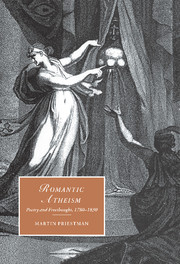Book contents
- Frontmatter
- Contents
- List of illustrations
- Acknowledgements
- Introduction
- 1 The atheism debate, 1780–1800
- 2 Masters of the universe: Lucretius, Sir William Jones, Richard Payne Knight and Erasmus Darwin
- 3 And did those feet? Blake in the 1790s
- 4 The tribes of mind: the Coleridge circle in the 1790s
- 5 Whatsoe'er is dim and vast: Wordsworth in the 1790s
- 6 Temples of reason: atheist strategies, 1800—1830
- 7 Pretty paganism: the Shelley generation in the 1810s
- Conclusion
- Glossary of theological and other terms
- Notes
- Bibliography
- Index
- CAMBRIDGE STUDIES IN ROMANTICISM
2 - Masters of the universe: Lucretius, Sir William Jones, Richard Payne Knight and Erasmus Darwin
Published online by Cambridge University Press: 22 September 2009
- Frontmatter
- Contents
- List of illustrations
- Acknowledgements
- Introduction
- 1 The atheism debate, 1780–1800
- 2 Masters of the universe: Lucretius, Sir William Jones, Richard Payne Knight and Erasmus Darwin
- 3 And did those feet? Blake in the 1790s
- 4 The tribes of mind: the Coleridge circle in the 1790s
- 5 Whatsoe'er is dim and vast: Wordsworth in the 1790s
- 6 Temples of reason: atheist strategies, 1800—1830
- 7 Pretty paganism: the Shelley generation in the 1810s
- Conclusion
- Glossary of theological and other terms
- Notes
- Bibliography
- Index
- CAMBRIDGE STUDIES IN ROMANTICISM
Summary
Mother of Aeneas and his race, delight of men and gods, life-giving Venus, it is your doing that under the wheeling constellations of the sky all nature teems with life, both the sea that buoys up our ships and the earth that yields our food … So throughout seas and uplands, rushing torrents, verdurous meadows and the leafy shelters of the birds, into the breasts of one and all you instil alluring love, so that with passionate longing they reproduce their several breeds. Since you alone are the guiding power of the universe and without you nothing emerges into the shining sunlit world to grow in joy and loveliness, yours is the partnership I seek in trying to compose these lines On the Nature of the Universe.
So, in part, begins the Roman poet Lucretius' De Rerum Natura, written in the first century BC in six books aiming to instil the principles of Epicurean materialist philosophy. Though it opens with this much-quoted invocation to Venus, the first book wastes no time in insisting that Epicurus has shown us that the gods have no interest in man or the universe, that there is no after-life, and that all of space is made up simply of ‘atoms and void’.
- Type
- Chapter
- Information
- Romantic AtheismPoetry and Freethought, 1780–1830, pp. 44 - 79Publisher: Cambridge University PressPrint publication year: 2000

